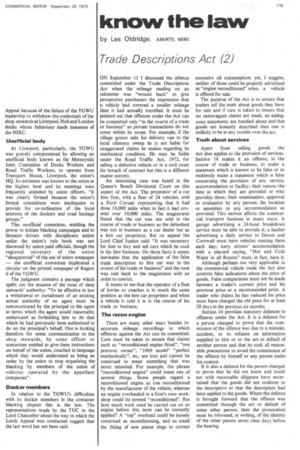know the law
Page 417

If you've noticed an error in this article please click here to report it so we can fix it.
by Les Oldridge, AMIRTE, MIMI
Trade Descriptions Act (2)
ON September 15 I discussed the offence committed under the Trade Descriptions Act when the mileage reading on an odometer was "wound back" to give prospective purchasers the impression that a vehicle had covered a smaller mileage than it had actually travelled. It must be pointed out that offences under the Act can be committed only "in the course of a trade or business" so private transactions do not come within its scope. For example, if the village grocer sells his delivery van to the local chimney sweep he is not liable for exaggerated claims he makes regarding its mechanical condition. He may be liable under the Road Traffic Act, 1972, for selling a defective vehicle or in a civil court for breach of contract but this is a different matter entirely.
An interesting case was heard in the Queen's Bench Divisional Court on this aspect of the Act. The proprietor of a car hire firm, with a fleet of 24 vehicles, sold a Ford Corsair representing that it had done 34,000 miles when in fact it had covered over 50,000 miles. The magistrates found that the car was not sold in the course of trade or business as the defendant was not in business as a car dealer but as a hire car proprietor. But on appeal the Lord Chief Justice said: "It was necessary for him to buy and sell cars which he used in his hire business. On these facts it seems inevitable that the application of the false trade description to this car was in the course of his trade or business" and the case was sent back to the magistrates with an order to convict.
It seems to me that the operator of a fleet of lorries or coaches is in much the same position as the hire car proprietor and when a vehicle is sold it is in the course of his trade or business.
The recon engine There are many other ways besides inaccurate mileage recordings in which offences against the Act can be committed. Care must be taken to ensure that claims such as "reconditioned engine fitted", "one previous owner", "1969 model" "perfect mechanically", etc, are true and cannot be construed to mean something that was never intended. For example, the phrase "reconditioned engine" could mean one of several things. Some people regard a reconditioned engine as one reconditioned by the manufacturer of the vehicle, whereas an engine overhauled in a firm's own workshop could be termed "reconditioned". But how much work need be carried out on an engine before this term can be correctly applied? A "top" overhaul could be loosely construed as reconditioning, and so could the fitting of new piston rings to correct excessive oil consumption; yet, 1 suggest, neither of these could be properly advertised as "engine reconditioned" when a vehicle is offered for sale.
The purpose of the Act is to ensure that traders tell the truth about goods they have for sale and if care is taken to ensure that no extravagant claims are made, no ambiguous statements are bandied about and that goods are honestly described then one is unlikely to be in any trouble over the act.
Truth about services Apart from selling goods the Act also applies to the provision of services. Section 14 makes it an offence, in the course of trade or business, to make a statement which is known to be false or to recklessly make a statement which is false concerning the provision of any service, accommodation or facility; their nature; the time at which they are provided or who provides them; their examination, approval or evaluation by any person; the location or amenities or any accommodation so provided. This section affects the commercial transport business in many ways. A garage advertising a 24-hour breakdown service must be able to provide it; a haulier advertising a daily service to Devon and Cornwall must have vehicles running there each day; lorry drivers' accommodation with a placard saying, "Hot and Cold Water in all Rooms" must, in fact, have it.
Although perhaps not very applicable to the commercial vehicle trade the Act also controls false indications about the price of goods. False comparisons must not be made between a trader's current price and his previous price or a recommended price. A trader who claims he has reduced his price must have charged the old price for at least 28 days in the previous six months.
Section 24 provides statutory defences to offences under the Act. It is a defence for a person charged to prove that the commission of the offence was due to a mistake, accident, or to reliance on information supplied to him or to the act or default of another person and that he took all reasonable precautions to avoid the commission of the offence by himself or any person under his control.
It is also a defence for the person charged to prove that he did not know and could not with reasonable diligence have ascertained that the goods did not conform to the description or that the description had been applied to the goods. Where the defence is brought forward that the offence was committed through the act or default of some other person, then the prosecution, must be informed, in writing, of the identity of the other person seven clear days before the hearing.
































































































































































































































































































































































































































































































































